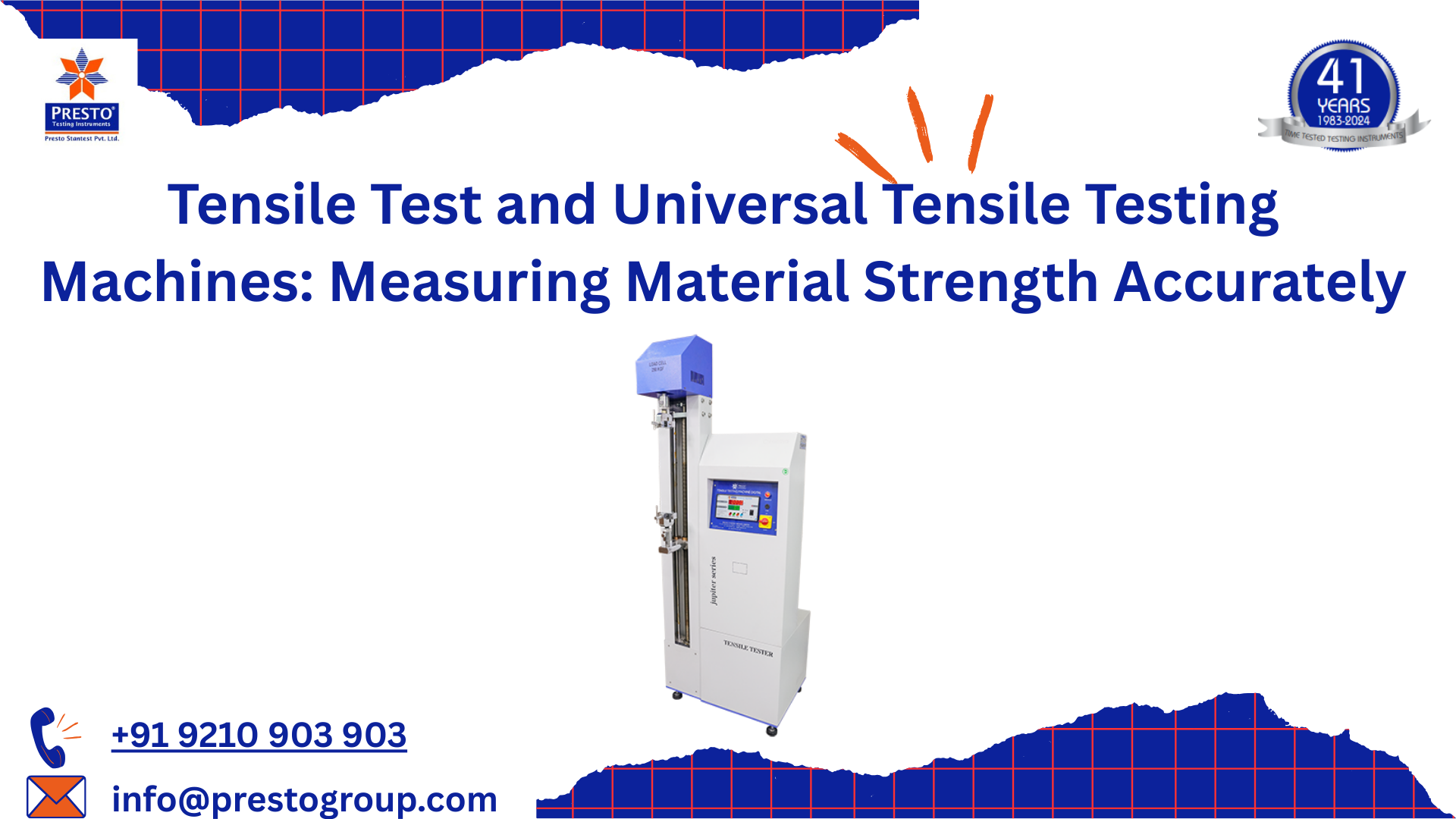Tensile Test and Universal Tensile Testing Machines: Measuring Material Strength Accurately

In engineering, manufacturing, and quality assurance, understanding the mechanical properties of materials is essential. A tensile test provides critical insights into how materials perform under pulling forces, helping engineers ensure that products are durable, safe, and reliable.
Whether you are working with metals, plastics, polymers, or composites, a tensile strength testing machine—especially a universal tensile testing machine (UTM)—is the go-to solution for laboratories and industrial testing facilities. This blog covers the essentials of tensile testing, the benefits of using a universal tensile tester, factors affecting tensile testing machine price, and real-world applications.
What is a Tensile Test?
A tensile test is a fundamental method for evaluating a material's response to tension. During this test, a specimen is pulled gradually until it fractures. The results help determine important mechanical properties such as:
-
Ultimate Tensile Strength (UTS): Maximum load a material can withstand before breaking.
-
Yield Strength: Stress level at which permanent deformation occurs.
-
Elongation at Break: How much a material stretches before failure.
-
Modulus of Elasticity: Measure of material stiffness.
These parameters are crucial for designing products that meet safety standards and perform reliably under real-world conditions.
Types of Tensile Testing Machines
1. Universal Tensile Testing Machine (UTM)
A universal tensile testing machine is a versatile device that can perform tensile, compression, bending, and shear tests. It is widely used in laboratories and industries because of its flexibility. Key features include:
-
Wide load range, from a few Newtons to several hundred kilonewtons.
-
Digital controllers for accurate speed and load management.
-
Software for recording data, plotting stress-strain curves, and generating reports.
2. Single-Function Tensile Testing Machines
These machines focus exclusively on tensile tests and are often simpler and more cost-effective than UTMs. While they may not support multiple tests, they deliver accurate tensile strength measurements for metals, plastics, and polymers.
How a Tensile Testing Machine Works
A tensile strength testing machine operates through a controlled and precise process:
-
Specimen Preparation: The sample is shaped according to ASTM, ISO, or IS standards.
-
Mounting: The specimen is clamped securely in the machine.
-
Testing: The machine applies a tensile force at a controlled speed until the specimen breaks.
-
Data Collection: Load, elongation, and stress-strain data are recorded.
-
Analysis: Calculations include Ultimate Tensile Strength, Yield Strength, and elongation.
Modern universal tensile testers feature automated controls, digital displays, and software for analysis, making testing accurate, efficient, and reproducible.
Factors Affecting Tensile Testing Machine Price
The tensile testing machine price varies depending on several factors:
-
Load Capacity: Machines that handle higher loads are more expensive.
-
Automation: Fully automated UTMs with advanced digital controls cost more than manual models.
-
Accuracy & Precision: High-resolution load cells and extensometers increase the price.
-
Material Compatibility: Machines designed for metals, polymers, or composites may differ in cost.
-
Brand & Warranty: Established brands with extended warranties generally charge more.
Investing in a high-quality universal tensile testing machine ensures long-term reliability and accurate results, making it a cost-effective choice over time.
Applications of Tensile Testing Machines
Tensile testing is critical in a variety of industries:
-
Metals & Alloys: Evaluating steel, aluminum, and other metals for tensile strength and ductility.
-
Plastics & Polymers: Measuring elongation, elasticity, and tensile properties of thermoplastics and composites.
-
Textiles: Testing fabrics, ropes, and fibers for strength and durability.
-
Rubber & Elastomers: Determining elongation at break and tensile strength.
-
Automotive & Aerospace: Ensuring mechanical reliability of components and fasteners.
-
Construction Materials: Testing structural materials for bridges, buildings, and pipelines.
A tensile strength testing machine provides essential data for quality control, R&D, and product certification.
Advantages of a Universal Tensile Tester
-
Multi-functionality: Perform tensile, compression, and bending tests with one machine.
-
High Accuracy: Advanced load cells and digital controls provide precise measurements.
-
Automated Reporting: Software simplifies data analysis and generates detailed reports.
-
Enhanced Safety: Features like overload protection and emergency stops improve user safety.
-
Versatility: Suitable for a wide range of materials, including metals, plastics, and composites.
A universal tensile testing machine allows manufacturers to test multiple materials efficiently while ensuring precise results.
Maintenance Tips for Tensile Testing Machines
To ensure your tensile testing machine operates reliably:
-
Regularly calibrate using certified standards.
-
Keep clamps and grips clean to prevent slippage.
-
Inspect load cells and extensometers for wear.
-
Maintain software updates and proper configuration.
-
Store the machine in a dust-free, controlled environment.
Proper maintenance extends machine life and guarantees consistent, accurate test results.
Conclusion
A tensile test is essential for understanding how materials perform under stress. Whether using a tensile strength testing machine, a universal tensile tester, or a single-function tensile machine, precise testing is crucial for product quality, safety, and compliance.
Understanding the tensile testing machine price relative to capacity, accuracy, and features ensures informed investment decisions. A high-quality universal tensile testing machine provides reliable data, versatile testing options, and long-term performance—helping industries design safer, stronger, and more durable products.
Contact Presto Group
Looking for a reliable tensile testing machine or universal tensile tester? Presto Group offers precision-engineered machines suitable for metals, plastics, polymers, and composites.
📞 Call us at: +91 9210 903 903
📧 Email: info@prestogroup.com
Our experts will help you select the ideal tensile strength testing machine for your laboratory or industrial needs.
- Art
- Causes
- Crafts
- Dance
- Drinks
- Film
- Fitness
- Food
- Games
- Gardening
- Health
- Home
- Literature
- Music
- Networking
- Other
- Party
- Religion
- Shopping
- Sports
- Theater
- Wellness


